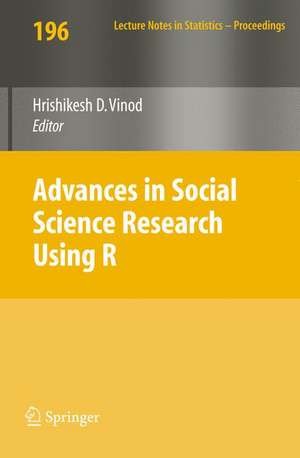Advances in Social Science Research Using R: Lecture Notes in Statistics, cartea 196
Editat de Hrishikesh D. Vinoden Limba Engleză Paperback – 12 ian 2010
Din seria Lecture Notes in Statistics
- 15%
 Preț: 631.86 lei
Preț: 631.86 lei -
 Preț: 385.84 lei
Preț: 385.84 lei - 17%
 Preț: 490.20 lei
Preț: 490.20 lei - 17%
 Preț: 460.30 lei
Preț: 460.30 lei - 18%
 Preț: 945.92 lei
Preț: 945.92 lei - 20%
 Preț: 561.44 lei
Preț: 561.44 lei - 18%
 Preț: 943.25 lei
Preț: 943.25 lei - 18%
 Preț: 943.25 lei
Preț: 943.25 lei - 15%
 Preț: 641.38 lei
Preț: 641.38 lei -
 Preț: 428.67 lei
Preț: 428.67 lei - 15%
 Preț: 633.53 lei
Preț: 633.53 lei - 15%
 Preț: 658.88 lei
Preț: 658.88 lei -
 Preț: 383.33 lei
Preț: 383.33 lei - 15%
 Preț: 640.71 lei
Preț: 640.71 lei - 18%
 Preț: 947.18 lei
Preț: 947.18 lei - 18%
 Preț: 1007.35 lei
Preț: 1007.35 lei - 18%
 Preț: 942.63 lei
Preț: 942.63 lei - 15%
 Preț: 639.59 lei
Preț: 639.59 lei - 18%
 Preț: 1231.47 lei
Preț: 1231.47 lei - 15%
 Preț: 643.00 lei
Preț: 643.00 lei - 18%
 Preț: 886.62 lei
Preț: 886.62 lei -
 Preț: 383.12 lei
Preț: 383.12 lei - 15%
 Preț: 633.35 lei
Preț: 633.35 lei - 15%
 Preț: 635.65 lei
Preț: 635.65 lei -
 Preț: 393.74 lei
Preț: 393.74 lei - 15%
 Preț: 632.70 lei
Preț: 632.70 lei - 15%
 Preț: 637.28 lei
Preț: 637.28 lei - 15%
 Preț: 702.87 lei
Preț: 702.87 lei - 15%
 Preț: 642.68 lei
Preț: 642.68 lei - 15%
 Preț: 644.63 lei
Preț: 644.63 lei - 15%
 Preț: 645.14 lei
Preț: 645.14 lei -
 Preț: 382.36 lei
Preț: 382.36 lei - 15%
 Preț: 636.30 lei
Preț: 636.30 lei - 15%
 Preț: 647.92 lei
Preț: 647.92 lei -
 Preț: 380.63 lei
Preț: 380.63 lei - 18%
 Preț: 887.05 lei
Preț: 887.05 lei - 15%
 Preț: 634.32 lei
Preț: 634.32 lei - 15%
 Preț: 648.74 lei
Preț: 648.74 lei -
 Preț: 378.92 lei
Preț: 378.92 lei - 15%
 Preț: 648.56 lei
Preț: 648.56 lei - 15%
 Preț: 647.59 lei
Preț: 647.59 lei - 18%
 Preț: 780.37 lei
Preț: 780.37 lei - 15%
 Preț: 641.20 lei
Preț: 641.20 lei - 18%
 Preț: 1102.69 lei
Preț: 1102.69 lei - 15%
 Preț: 643.16 lei
Preț: 643.16 lei -
 Preț: 384.70 lei
Preț: 384.70 lei
Preț: 990.57 lei
Preț vechi: 1208.01 lei
-18% Nou
Puncte Express: 1486
Preț estimativ în valută:
189.55€ • 202.69$ • 158.04£
189.55€ • 202.69$ • 158.04£
Carte tipărită la comandă
Livrare economică 18 aprilie-02 mai
Preluare comenzi: 021 569.72.76
Specificații
ISBN-13: 9781441917638
ISBN-10: 1441917632
Pagini: 232
Ilustrații: XXIII, 205 p.
Dimensiuni: 155 x 235 x 18 mm
Greutate: 0.33 kg
Ediția:2010
Editura: Springer
Colecția Springer
Seriile Lecture Notes in Statistics, Lecture Notes in Statistics - Proceedings
Locul publicării:New York, NY, United States
ISBN-10: 1441917632
Pagini: 232
Ilustrații: XXIII, 205 p.
Dimensiuni: 155 x 235 x 18 mm
Greutate: 0.33 kg
Ediția:2010
Editura: Springer
Colecția Springer
Seriile Lecture Notes in Statistics, Lecture Notes in Statistics - Proceedings
Locul publicării:New York, NY, United States
Public țintă
ResearchCuprins
Econometric Computing with #x201C;R#x201D;.- Additive Models for Quantile Regression: An Analysis of Risk Factors for Malnutrition in India.- Toward Better R Defaults for Graphics: Example of Voter Turnouts in U.S. Elections.- Superior Estimation and Inference Avoiding Heteroscedasticity and Flawed Pivots: R-example of Inflation Unemployment Trade-off.- Bubble Plots as a Model-Free Graphical Tool for Continuous Variables.- Combinatorial Fusion for Improving Portfolio Performance.- Reference Growth Charts for Saudi Arabian Children and Adolescents.- Causal Mediation Analysis Using R.- Statistical Validation of Functional Form in Multiple Regression Using R.- Fitting Multinomial Models in R: A Program Based on Bock#x2019;s Multinomial Response Relation Model.- A Bayesian Analysis of Leukemia Incidence Surrounding an Inactive Hazardous Waste Site.- Stochastic Volatility Model with Jumps in Returns and Volatility: An R-Package Implementation.
Recenzii
“In the introduction of Advances in social Science Research Using R, the editor gives valuable short summaries of all chapters to point out that each one is of relevance beyond the scope of the disciplines where the methods or authors originate…Several chapters are well suited for social scientists interested in new methodology and how to use it in R. These chapters not only introduce advanced statistical techniques, but also walk the reader through their usage in R in a concise and yet instructive way…Other chapters show that …complex econometric research questions can be addressed with R…and illustrate the variety of advanced methods now available ….” (Journal of Statistical Software, Vol. 34, Book Review 2, April 2010)
Textul de pe ultima copertă
This book covers recent advances for quantitative researchers with practical examples from social sciences. The twelve chapters written by distinguished authors cover a wide range of issues--all providing practical tools using the free R software.
McCullough: R can be used for reliable statistical computing, whereas most statistical and econometric software cannot. This is illustrated by the effect of abortion on crime.
Koenker: Additive models provide a clever compromise between parametric and non-parametric components illustrated by risk factors for Indian malnutrition.
Gelman: R graphics in the context of voter participation in US elections.
Vinod: New solutions to the old problem of efficient estimation despite autocorrelation and heteroscedasticity among regression errors are proposed and illustrated by the Phillips curve tradeoff between inflation and unemployment.
Markus and Gu: New R tools for exploratory data analysis including bubble plots.
Vinod, Hsu and Tian: New R tools for portfolio selection borrowed from computer scientists and data-mining experts; relevant to anyone with an investment portfolio.
Foster and Kecojevic: Extends the usual analysis of covariance (ANCOVA) illustrated by growth charts for Saudi children.
Imai, Keele, Tingley, and Yamamoto: New R tools for solving the age-old scientific problem of assessing the direction and strength of causation. Their job search illustration is of interest during current times of high unemployment.
Haupt, Schnurbus, and Tschernig: Consider the choice of functional form for an unknown, potentially nonlinear relationship, explaining a set of new R tools for model visualization and validation.
Rindskopf: R methods to fit a multinomial based multivariate analysisof variance (ANOVA) with examples from psychology, sociology, political science, and medicine. Neath: R tools for Bayesian posterior distributions to study increased disease risk in proximity to a hazardous waste site.
Numatsi and Rengifo: Explain persistent discrete jumps in financial series subject to misspecification.
McCullough: R can be used for reliable statistical computing, whereas most statistical and econometric software cannot. This is illustrated by the effect of abortion on crime.
Koenker: Additive models provide a clever compromise between parametric and non-parametric components illustrated by risk factors for Indian malnutrition.
Gelman: R graphics in the context of voter participation in US elections.
Vinod: New solutions to the old problem of efficient estimation despite autocorrelation and heteroscedasticity among regression errors are proposed and illustrated by the Phillips curve tradeoff between inflation and unemployment.
Markus and Gu: New R tools for exploratory data analysis including bubble plots.
Vinod, Hsu and Tian: New R tools for portfolio selection borrowed from computer scientists and data-mining experts; relevant to anyone with an investment portfolio.
Foster and Kecojevic: Extends the usual analysis of covariance (ANCOVA) illustrated by growth charts for Saudi children.
Imai, Keele, Tingley, and Yamamoto: New R tools for solving the age-old scientific problem of assessing the direction and strength of causation. Their job search illustration is of interest during current times of high unemployment.
Haupt, Schnurbus, and Tschernig: Consider the choice of functional form for an unknown, potentially nonlinear relationship, explaining a set of new R tools for model visualization and validation.
Rindskopf: R methods to fit a multinomial based multivariate analysisof variance (ANOVA) with examples from psychology, sociology, political science, and medicine. Neath: R tools for Bayesian posterior distributions to study increased disease risk in proximity to a hazardous waste site.
Numatsi and Rengifo: Explain persistent discrete jumps in financial series subject to misspecification.
Caracteristici
Includes supplementary material: sn.pub/extras















